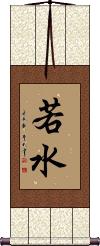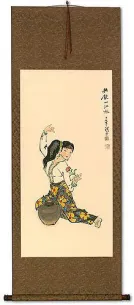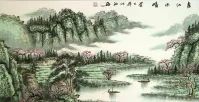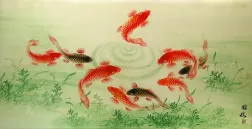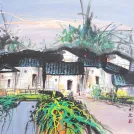Many custom options...
And formats...

Be Water My Friend in Chinese / Japanese...
Buy a Be Water My Friend calligraphy wall scroll here!
Personalize your custom “Be Water My Friend” project by clicking the button next to your favorite “Be Water My Friend” title below...
Ultimate Goodness of Water
Quote from Lao Tzu
Be Like Water
像水一樣 is a short quote from a much longer statement by Bruce Lee.
He summarized how people should be flexible to all circumstances, attacks, or situations. In the end, he exclaims, “Be like water, my friend.” 像水一樣 is the “Be like water” part alone since that seems to be what most people want.
Be Like Water
Quote from Lao Tzu
若水 is part of a very old saying from Lao Tzu.
In these two characters, there is a suggestion to be like water. The full phrase is about the goodness and purity of water. So, when this suggests being like water, it is actually a suggestion to be a good person (one who does not dishonor himself/herself, etc.).
This in-stock artwork might be what you are looking for, and ships right away...
Gallery Price: $60.00
Your Price: $36.88
Gallery Price: $240.00
Your Price: $98.88
Gallery Price: $144.00
Your Price: $79.88
Gallery Price: $400.00
Your Price: $138.88
Gallery Price: $121.00
Your Price: $66.88
Gallery Price: $72.00
Your Price: $39.88
Gallery Price: $448.00
Your Price: $248.88
Gallery Price: $60.00
Your Price: $36.88
Gallery Price: $60.00
Your Price: $36.88
Gallery Price: $126.00
Your Price: $69.88
Not the results for be water my friend that you were looking for?
Below are some entries from our dictionary that may match your be water my friend search...
| Characters If shown, 2nd row is Simp. Chinese |
Pronunciation Romanization |
Simple Dictionary Definition |
上善若水 see styles |
shàng shàn ruò shuǐ shang4 shan4 ruo4 shui3 shang shan jo shui |
More info & calligraphy: Ultimate Goodness of Water |
高山流水 see styles |
gāo shān liú shuǐ gao1 shan1 liu2 shui3 kao shan liu shui kouzanryuusui / kozanryusui こうざんりゅうすい |
fig. intimate and understanding friend; sublime musical composition (1) (yoji) high mountains and running water; the beauty of nature; (2) beautifully (skillfully) played music |
The following table may be helpful for those studying Chinese or Japanese...
| Title | Characters | Romaji (Romanized Japanese) | Various forms of Romanized Chinese | |
| Ultimate Goodness of Water | 上善若水 | shàng shàn ruò shuǐ shang4 shan4 ruo4 shui3 shang shan ruo shui shangshanruoshui | shang shan jo shui shangshanjoshui |
|
| Be Like Water | 像水一樣 | xiàng shuǐ yí yàng xiang4 shui3 yi2 yang4 xiang shui yi yang xiangshuiyiyang | hsiang shui i yang hsiangshuiiyang |
|
| Be Like Water | 若水 | ruò shuǐ / ruo4 shui3 / ruo shui / ruoshui | jo shui / joshui | |
Successful Chinese Character and Japanese Kanji calligraphy searches within the last few hours...


